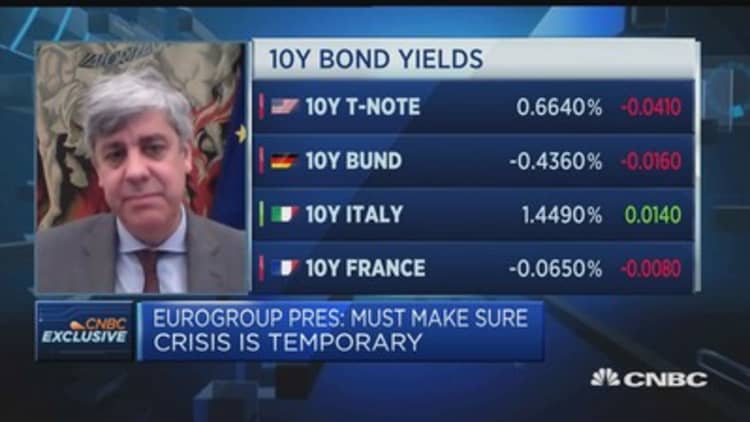The 19 finance ministers of the euro area are looking for a new president, at a time when the region is facing tough negotiations over a 750 billion euro ($851 billion) fiscal plan to help it recover from the coronavirus crisis.
The Eurogroup, which brings together the finance chiefs of countries that share the euro, will welcome applications from Thursday afternoon in a process that's due to be concluded by July 9.
It comes after Mario Centeno, the current Eurogroup president, resigned from the Portuguese government, where he had served as a finance minister since October 2015. Being a sitting finance minister is a precondition to serve as Eurogroup chief.
Even before the official process begins, there are three names being mentioned as potential candidates: Spain's finance minister Nadia Calvino, Luxembourg's finance chief Pierre Gramegna and, from Ireland, Paschal Donohoe.
Irrespective of who applies for the job, the decision comes at time of division within the region.
Some European countries are pushing for a bold and unprecedented fiscal stimulus, whereas other, more fiscally-conservative countries, are wary of taking on too much risk.
This split is evident in ongoing discussions about a 750 billion euro plan to prop up the wider European Union amid the Covid-19 pandemic.
The European Commission, the executive arm of the EU, proposed last month that the amount should be raised in financial markets and distributed to member states, so they can deal with the economic shock from the crisis. It plans to disburse 500 billion euros as grants and 250 billion euros as loans.

An EU official, who didn't want to be named due to the sensitivity of the talks, told CNBC this week that after an initial discussion among finance ministers, some countries challenged whether the European Commission was legally able to tap the markets at such a large scale.
The same official said there were also differences over the size of the market intervention, how much should be distributed to each country, what sort of conditions should come attached to future disbursements, as well as how long the stimulus should last.
The final say over these details belongs to the heads of state, who will have their first negotiation next Friday. At least one more negotiation is expected before all the details are ironed out.
This additional fiscal stimulus will come on top of 540 billion euros that have been made available in loans to businesses and governments, plus support to employment schemes. Furthermore, the European Central Bank is also purchasing governments bonds as part of a wider 1.35 trillion euro package to keep borrowing costs down in the euro zone.



